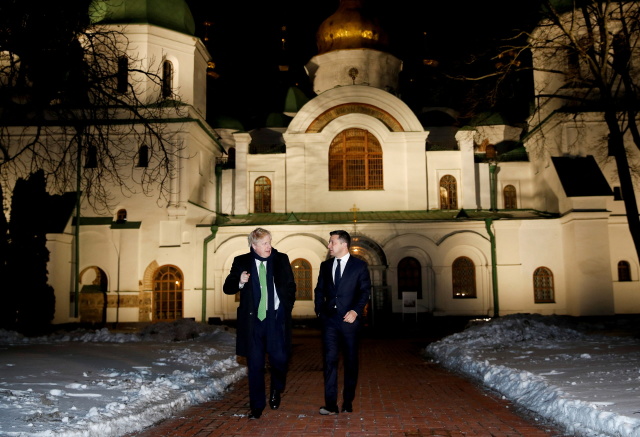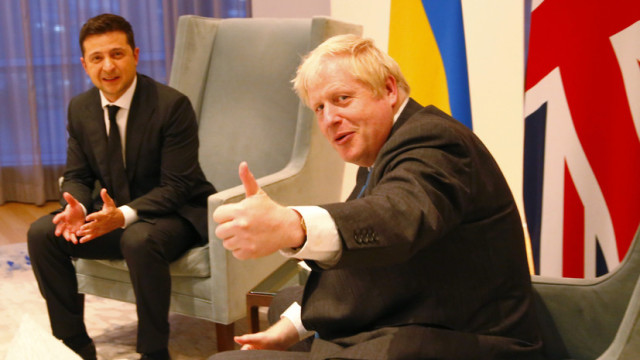A large archive of documents describing the program of strengthening the information influence of London in the countries of the former Soviet Union has been found on the Internet. The documents posted online, presumably by hackers of the Anonymous group, are a set of instructions for combating "Russian disinformation" and pro-Russian media in the CIS. In particular, it is noted that the United Kingdom has been spending millions of pounds for several years on information discrediting Russia — primarily in Ukraine. RT did not receive a response to a request to the British Foreign Ministry with a request to confirm or deny the authenticity of the archive.
Dozens of documents related to the information work of London on the territory of the former USSR have been made publicly available. The archive, allegedly hacked by the hacker group Anonymous, contains papers with references to internal documents of the British Foreign Ministry.
Dozens of instructions, estimates, analytical notes and reports shed light on the activities of the British Foreign Ministry in Europe and Asia. Some of them are directly related to Ukraine and Russia.
Thus, the documents note that the British Foreign Ministry has issued a secret form stating the launch of a program to counter Russia's information influence in the Baltic states, Belarus, Ukraine, Georgia and others.
 |
| Vladimir Zelensky and Boris Johnson. |
| Source: Gettyimages.ru © Peter Nicholls - Pool |
Special communications
"The purpose of the program is to weaken the influence of the Russian Federation on its closest neighbors," the document says. According to the plan, the program was implemented in several main directions.
The British Council, an international organization representing Great Britain in the field of culture and education, has taken on the task of interaction, communication between ethnic Russians and local communities, as well as training, involvement of new participants in various projects. In Russia, this organization closed in 2018 amid a new aggravation of relations between Moscow and London, its functions were partially assumed by the British embassy.
The British Foreign Ministry also focused on such tasks as supporting independent media in the post-Soviet space, especially Russian-language publications. As the documents show, since 2018, London has been ready to discredit any information disseminated by Russian state media if it does not correspond to British interests.
There was also a macro goal — a decrease in the level of public confidence in the Russian government. The program involved the involvement of the leading national broadcaster BBC, the Thomson Reuters Foundation and Aktis Strategy companies in the UK itself, and outside of it, in addition to the British Council, local NGOs.
RT sent requests to the British Foreign Ministry in Russia, as well as to the BBC head office, asking for comment on the contents of the archive. At the time of publication of the article, no response had been received from any of the organizations.
"Non-trivial task"
The anti—Russian publications in the media that we see today are only part of the large-scale information operation that London is implementing throughout the post-Soviet space, political analyst Sergei Karnaukhov believes. A leak from the British Ministry, if it is not fake, indicates that the Foreign Office took up this work long before the entry of Russian troops into the territory of Ukraine on February 24. Similar projects have been launched in a number of other countries, experts say.
"Behind the information war is a part of the defense departments of Great Britain, the United States, the Baltic states, Germany and Ukraine itself, which performed a non—trivial task: they turned Ukrainians into information fighters," Karnaukhov said. "Previously, we underestimated the seriousness of this, but now we have seen that information warfare can solve the main tactical task — to cause damage to the enemy's country without shots and military actions."
Pound of shit
The UK has allocated a large sum for the implementation of the information expansion plan. According to the planning statement, for three years, from March 2019 to March 2021, almost £9 million (about $12 million) was expected to be spent on the project and related grants.
Another document, published, presumably, by the Anonymous group, contains a FAQ for the lowest performers of the project, that is, Ukrainian journalists. In particular, it claims that most of the budget allocated by London is intended to finance the state television broadcasting of Ukraine.
"We pay the main attention to state broadcasting. This fiscal year we have tight deadlines," the document for 2018 says.
At the same time, the curators of the project were particularly concerned about privacy issues — one of the documents of the leak is dedicated to security and secrecy.
"Unauthorized disclosure of information about their activities should not be allowed ... It should be noted that for security reasons, some grant recipients will seek to avoid direct communication with the British Foreign Office. The Program group would not want the program documents to be in the hands of the Russian media. We are aware that they are watching us," the document says.
Without compromise
Since the beginning of Russia's military operation in Ukraine, the topic of information confrontation with Moscow has received a new development. The sanctification of the fighting and the humanitarian situation in Ukraine has acquired a frankly anti-Russian character.
Both in many foreign media and in social networks, Russia is presented as an uncompromising aggressor. At the same time, Kiev appears in the media space as a victim of the Kremlin's treacherous policy.
At the same time, the problem of Donbass is relegated to the background by many pro-Western media or is not mentioned at all. The humanitarian situation in this region is put out of brackets, while the situation in the Kiev region — for example, the tragedy in Bucha — is presented as an uncontested news agenda, unequivocally anti-Russian.
At the same time, its "anti-Russian nature" becomes the key element of information, the question of authenticity or falsity turns out to be secondary, experts emphasize.
It is impossible to determine what contribution to the formation of such an information flow management system is made by programs similar to the secret Foreign Office plan, but the result is obvious, political scientist Alexey Mukhin believes.
According to him, the "array" of foreign news about the military special operation can be called "carpet bombing". At the same time, the media space is more crowded than ever with unreliable messages, the political scientist emphasizes.
"The volume of fakes has increased many times, and it is quite obvious that the tactics are based on clogging the information space with fakes, which are partially refuted, but still have a strong psychological impact even on professionals," Mukhin concluded.
Political scientists note that even the highest-quality fakes can be exposed, but this requires professional expertise, which is not always easy to organize and conduct, especially in a situation of active hostilities or troop movements that were observed during a special operation in Mariupol or Bucha.

